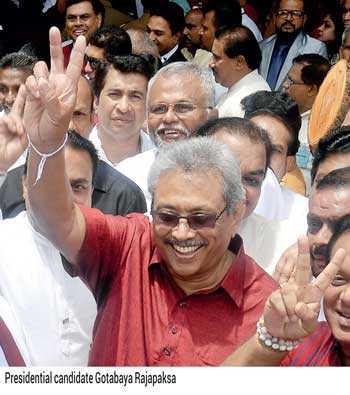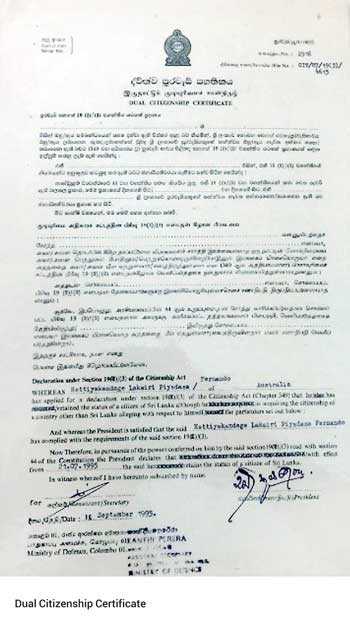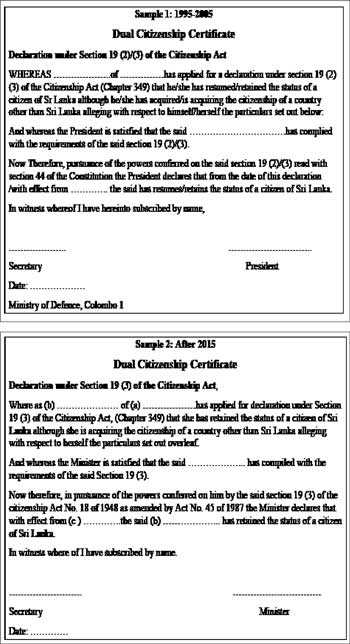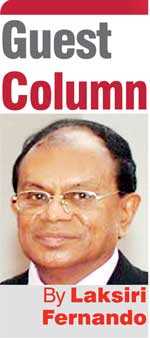Saturday Feb 07, 2026
Saturday Feb 07, 2026
Thursday, 10 October 2019 01:20 - - {{hitsCtrl.values.hits}}
Instead of politically campaigning against, and explaining to the people, the possible dangers of the return of the ‘Rajapaksa family rule,’ two civil society activists opted to challenge the citizenship of the SLPP candidate, Gotabaya Rajapaksa, at the Appeal Court at the last moment, without allowing those matters to be settled at the Independent Election Commission on the nominations day, if there were any doubts.
This infantile misadventure is quite unfortunate and unnecessary in respect of democracy, democratic elections, civil society role in the political system. The fallout unfortunately might disadvantage the forces against GR candidacy and strengthen the SLPP constituency, at least in the immediate context.
In a Voltaireian spirit, ‘one could oppose very strongly GR candidacy for the presidency, but one should not oppose his right to contest the election’.
The Appeal Court unanimously dismissed the writ application after listening to the arguments on both sides, for four consecutive days. What became reprehensible was the jeering and behaviour of GR supporters in the courtroom when the verdict was announced. It is also reported that one of the applicants of the writ order has already been threatened and intimidated. Extremism naturally breeds extremism. 
Background
The background to the adventure perhaps was the rumours floated and the so-called ‘whistle blowing’ on the assumed partiality of the Chairperson of the Election Commission, a couple of weeks before.
The news was that ‘Mahinda Deshapriya Pledges Allegiance to Gota’ (Colombo Telegraph, 7 September). The same report alleged that one of the Commission members, Prof. Ratnajeevan Hoole, himself had expressed doubts about the renouncement of GR’s US citizenship. It further reported that the same member of the Commission also had expressed doubts about the dual citizenship certificate of GR issued in November 2005.
Of course if you don’t trust the independence of the Election Commission or the Chairperson, then you have to go before the Courts. Two alleged grounds before the courts were (1) that GR has not properly renounced his US citizenship and (2) more questionably or complicatedly, that his Dual Citizenship Certificate signed by the then President, Mahinda Rajapaksa (his brother of course) is not valid. 
On the first matter I have no competence, information or interest to talk about, but on the second matter, I have some information and interest, given my own dual citizenship. My attention was first drawn on this matter when a reputed ‘independent’ journalist, Rajan Phillips, wrote on ‘Plenary Powers and Citizenship’ (Colombo Telegraph, 3 October 2019) bashing the executive presidential system, as he does, for every evil under the sun. This was quite irrational apart from emotional.
It may be that plenary power is something a defence lawyer had mentioned at the court case, but it is not from any plenary power that a President signs a dual citizenship certificate, according to what I have in my possession. It derived from the Constitution before the 19th Amendment.
My evidence
My evidence is my own Dual Citizenship Certificate, a copy attached below, signed by the then President, Chandrika Kumaratunga!
If I may abstract what it contains in general terms, both the declaration and the authority in approving a dual citizenship certificate, it is as seen in Sample 1.
It appears to me that the printed format that was used in 1995 must have been the same format used in November 2005 for Gotabaya Rajapaksa. This was just after the tenure of the President Chandrika Kumaratunga. It must have also been the format perhaps used until the 19th Amendment in May 2015, when most of the powers of the President, including the grant of the dual citizenship, were curtailed or taken away. Let us not get into that argument here, whether it was correct or not.
According to the text, the President is the approving and the declaration authority, of dual citizenships under Section (2) (3) of the Citizenship Act, as the Minister of Defence and in accordance with Article 44 (2) of the Constitution before the 19th Amendment. It is utterly wrong and hilarious to interpret and question the situation prior to that amendment, on the basis of the 19th Amendment, or on one’s whims and fancies, whoever the person under question. This is infantile disorder. 
According to the format, of course the President does not necessarily need to sign the certificate although he/she can. The Signature of the Secretary to the Ministry of Defence is sufficient, ‘in witness whereof.’ As my certificate shows, an Assistant Secretary has signed for the Secretary. But having realised that it is not sufficient, the person who was coordinating the citizenship matters perhaps wanted to get the signature of the President.
Unfortunate circumstances
Therefore, the questioning of President Mahinda Rajapaksa signing the certificate of Gotabaya Rajapaksa (although his brother), does not at all appear rational to say the least. The questioning of the speed, the circumstances or the process may raise some political or moral questions, both ways, but not serious legal questions, in my opinion from the beginning when I came to know the matter. I am not saying this after the verdict.
If the impetus for the questioning came from some revelations or ‘whistle blowing’ of Prof. Hoole, it is quite unfortunate. In the article which I mentioned before, Ratnajeevan had given the following information to the Colombo Telegraph.
“While looking at GR’s Dual Citizenship Certificate on the 26th I asked him if he had signed his own certificate as Defence Secretary, and he nonchalantly replied that his predecessor had signed it. However, his predecessor could not have been Defence Secretary on 30 Nov. I let it pass.” 
The CT report also stated “However none of the three commissioners scrutinized the documents or indicated much interest in the affair.” It is quite possible that GR gave a dead-rope to Ratnajeevan ‘nonchalantly’! What else one would say if you ask ‘did you sign your own certificate!
After the 19th Amendment?
Sometimes, good things can emerge through bad deeds. ‘Every cloud has a silver lining,’ the saying goes. At least we can turn things in that direction. The case filed by the two civil society activists has generated some debate about the authority, procedure and conditions under which the dual citizenships are being awarded in our motherland. That would have been a good initiative if it were started before or without unduly politicising the issue or targeting a single person, however reprehensible his role has been in office in the past.
I don’t have very many examples but can produced a format under which the dual citizenships were being awarded since 2015. It may be that it is now improved or changed, but this is the specimen I can produce at the moment. See Sample 2. For confidentiality, I cannot produce the original or reveal the name of the person.
There are obvious ‘minor’ errors like (a) coming after (b), ‘whereas’ or ‘whereof’ spelled as two words (where as and where of), and having only one gender, admirably however all as ‘she.’ Therefore my male friend who showed me the certificate goes as ‘she.’ We all do make mistakes in writing, but this is an official state document. In fairness, I must say, it is possible that (a) (b) confusion is due to the Sinhala text translated into English.
It appears even before the 19th Amendment, but after the change in January 2015, it was not necessarily the President who authorised the dual citizenships but a Minister. (It is also possible that he also was issuing dual citizenship certificates). This may be considered a great achievement by some. But the question is the Declaration or the format that was used does not say what Minister. It is not printed.
The certificate I have seen was signed by John Amaratunga. What? Yes, John Amaratunga! He has signed with his seal as the Minister of Public Order and Christian Affairs in May 2015. His Secretary of the Ministry also has signed the document, but I don’t want to reveal the name as he must be just a public servant, if not a political appointee.
Conclusion
There can be few simple conclusions. (1) Politically motivated legal challenges are reprehensible without proper legal or moral basis. The JVP has already rejected Rajitha Senaratne’s insinuations about legal challenges on similar grounds as ‘madness.’ (2) Even for your worst political enemy, there should be some decency in dealing with political or other issues. (3) Those who advocate democracy should follow those principles first, like understanding human rights of everyone to have citizenship or change it. (4) There are serious questions about civil society organisations and activists based on the above discussed legal adventure and similar matters. (5) Independence of civil society activities from partisan politics and/or groups/cliques is of paramount importance.
(6) There are obvious defects and infirmities in the procedures and authority of issuing dual citizenship certificates, before and after 2015. These should be soon rectified and regularized with transparency. (7) People who obtain dual citizenship, after paying so much of money, should have a decent document (nicely printed!) without ambiguities. All dual citizenship certificates that I have seen so far are extremely poor documents issued before or after 2015. Sri Lankans with dual citizenship should not be embarrassed of having to produce a pitiable document to countries that they live in.